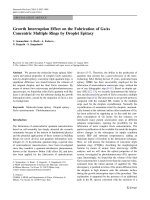The Project Gutenberg eBook, The Struggles of Brown, Jones, and Robinson, by Anthony Trollope ppt
Bạn đang xem bản rút gọn của tài liệu. Xem và tải ngay bản đầy đủ của tài liệu tại đây (1.79 MB, 766 trang )
The Project
Gutenberg
eBook, The
Struggles of
Brown, Jones,
and Robinson,
by Anthony
Trollope
This eBook is for the use of anyone
anywhere at no cost and with
almost no restrictions whatsoever. You may
copy it, give it away or
re-use it under the terms of the Project
Gutenberg License included
with this eBook or online at
www.gutenberg.org
Title: The Struggles of Brown, Jones,
and Robinson
By One of the Firm
Author: Anthony Trollope
Release Date: December 14, 2008
[eBook #27533]
HTML version most recently updated:
June 10, 2010
Language: English
Character set encoding: ISO-8859-1
***START OF THE PROJECT
GUTENBERG EBOOK THE STRUGGLES
OF BROWN, JONES, AND
ROBINSON***
E-text prepared by
Joseph E. Loewenstein,
M.D., and Delphine
Lettau
XIV).
Click to ENLARGE
THE STRUGGLES
OF
BROWN, JONES,
AND
ROBINSON:
BY ONE OF THE FIRM
EDITED BY ANTHONY
TROLLOPE.
AUTHOR OF "FRAMLEY PARSONAGE,"
"THE LAST CHRONICLE OF BARSET,"
&c. &c.
REPRINTED FROM THE "CORNHILL MAGAZINE."
WITH FOUR ILLUSTRATIONS.
LONDON:
SMITH, ELDER & CO., 15,
WATERLOO PLACE.
1870.
CONTENTS
I. PREFACE. BY ONE OF THE FIRM.
II.
THE EARLY HISTORY OF OUR MR.
BROWN,
WITH SOME FEW WORDS OF MR.
JONES.
III.
THE EARLY HISTORY OF MR.
ROBINSON.
IV.
NINE TIMES NINE IS EIGHTY-ONE.
SHOWING HOW BROWN,
JONES, AND ROBINSON SELECTED
THEIR HOUSE OF BUSINESS.
V. THE DIVISION OF LABOUR.
VI. IT IS OUR OPENING DAY.
VII.
MISS BROWN PLEADS HER OWN
CASE, AND MR. ROBINSON
WALKS ON BLACKFRIARS BRIDGE.
VIII.
MR. BRISKET THINKS HE SEES HIS
WAY, AND MR. ROBINSON
AGAIN WALKS ON BLACKFRIARS
BRIDGE.
IX.
SHOWING HOW MR. ROBINSON
WAS EMPLOYED
ON THE OPENING DAY.
X.
SHOWING HOW THE FIRM
INVENTED A NEW SHIRT.
XI. JOHNSON OF MANCHESTER.
XII. SAMSON AND DELILAH.
XIII. THE WISDOM OF POPPINS.
XIV. MISTRESS MORONY.
XV. MISS BROWN NAMES THE DAY.
XVI.
SHOWING HOW ROBINSON
WALKED UPON ROSES.
XVII. A TEA-PARTY IN BISHOPSGATE
STREET.
XVIII.
AN EVENING AT THE "GOOSE AND
GRIDIRON."
XIX. GEORGE ROBINSON'S MARRIAGE.
XX.
SHOWING HOW MR. BRISKET
DIDN'T SEE HIS WAY.
XXI. MR. BROWN IS TAKEN ILL.
XXII. WASTEFUL AND IMPETUOUS SALE.
XXIII. FAREWELL.
XXIV. GEORGE ROBINSON'S DREAM.
THE STRUGGLES
OF
BROWN, JONES, AND
ROBINSON.
CHAPTER I.
PREFACE.
BY ONE OF THE FIRM.
It will be observed by the literary
and commercial world that, in this
transaction, the name of the really
responsible party does not show on
the title-page. I—George Robinson—
am that party. When our Mr. Jones
objected to the publication of these
memoirs unless they appeared as
coming from the firm itself, I at once
gave way. I had no wish to offend
the firm, and, perhaps, encounter a
lawsuit for the empty honour of
seeing my name advertised as that
of an author. We had talked the
matter over with our Mr. Brown, who,
however, was at that time in
affliction, and not able to offer much
that was available. One thing he did
say; "As we are partners," said Mr.
Brown, "let's be partners to the end."
"Well," said I, "if you say so, Mr.
Brown, so it shall be." I never
supposed that Mr. Brown would set
the Thames on fire, and soon learnt
that he was not the man to amass a
fortune by British commerce. He was
not made for the guild of Merchant
Princes. But he was the senior
member of our firm, and I always
respected the old-fashioned doctrine
of capital in the person of our Mr.
Brown.
When Mr. Brown said, "Let's be
partners to the end; it won't be for
long, Mr. Robinson," I never said
another word. "No," said I, "Mr.
Brown; you're not what you was—
and you're down a peg; I'm not the
man to take advantage and go
against your last wishes. Whether for
long or whether for short, we'll pull
through in the same boat to the end.
It shall be put on the title-page—'By
One of the Firm.'" "God bless you, Mr.
Robinson," said he; "God bless you."
And then Mr. Jones started another
objection. The reader will soon
realize that anything I do is sure to
be wrong with Mr. Jones. It wouldn't
be him else. He next declares that I
can't write English, and that the book
must be corrected, and put out by an
editor? Now, when I inform the
discerning British Public that every
advertisement that has been posted
by Brown, Jones, and Robinson,
during the last three years has come
from my own unaided pen, I think
few will doubt my capacity to write
the "Memoirs of Brown, Jones, and
Robinson," without any editor
whatsoever.
On this head I was determined to
be firm. What! after preparing, and
correcting, and publishing such
thousands of advertisements in prose
and verse and in every form of which
the language is susceptible, to be
told that I couldn't write English! It
was Jones all over. If there is a party
envious of the genius of another
party in this sublunary world that
party is our Mr. Jones.
But I was again softened by a
touching appeal from our senior
partner. Mr. Brown, though prosaic
enough in his general ideas, was still
sometimes given to the Muses; and
now, with a melancholy and tender
cadence, he quoted the following
lines;—
"Let dogs delight to bark and bite,
For 'tis their nature to.
But 'tis a shameful sight to see, when
partners of one firm like we,
Fall out, and chide, and fight!"
So I gave in again.
It was then arranged that one of
Smith and Elder's young men should
look through the manuscript, and
make any few alterations which the
taste of the public might require. It
might be that the sonorous, and, if I
may so express myself, magniloquent
phraseology in which I was
accustomed to invite the attention of
the nobility and gentry to our last
importations was not suited for the
purposes of light literature, such as
this. "In fiction, Mr. Robinson, your
own unaided talents would doubtless
make you great," said to me the
editor of this Magazine; "but if I may
be allowed an opinion, I do think that
in the delicate task of composing
memoirs a little assistance may
perhaps be not inexpedient."
This was prettily worded; so what
with this, and what with our Mr.
Brown's poetry, I gave way; but I
reserved to myself the right of an
epistolary preface in my own name.
So here it is.
Ladies and Gentlemen,—I am not a
bit ashamed of my part in the
following transaction. I have done
what little in me lay to further British
commerce. British commerce is not
now what it was. It is becoming open
and free like everything else that is
British;—open to the poor man as
well as to the rich. That bugbear
Capital is a crumbling old tower, and
is pretty nigh brought to its last ruin.
Credit is the polished shaft of the
temple on which the new world of
trade will be content to lean. That, I
take it, is the one great doctrine of
modern commerce. Credit,—credit,—
credit. Get credit, and capital will
follow. Doesn't the word speak for
itself? Must not credit be
respectable? And is not the word
"respectable" the highest term of
praise which can be applied to the
British tradesman?
Credit is the polished shaft of the
temple. But with what are you to
polish it? The stone does not come
from the quarry with its gloss on.
Man's labour is necessary to give it
that beauteous exterior. Then
wherewith shall we polish credit? I
answer the question at once. With
the pumice-stone and sand-paper of
advertisement.
Different great men have
promulgated the different means by
which they have sought to subjugate
the world. "Audacity—audacity—
audacity," was the lesson which one
hero taught. "Agitate—agitate—
agitate," was the counsel of a
second. "Register—register—
register," of a third. But I say—
Advertise, advertise, advertise! And I
say it again and again—Advertise,
advertise, advertise! It is, or should
be, the Shibboleth of British
commerce. That it certainly will be so
I, George Robinson, hereby venture
to prophesy, feeling that on this
subject something but little short of
inspiration has touched my eager
pen.
There are those,—men of the old
school, who cannot rouse themselves









